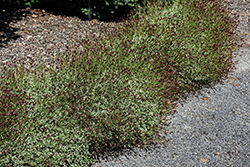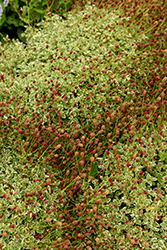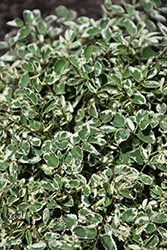It's all about ...
plants

Little Angel Burnet
Sanguisorba officinalis 'Little Angel'
Plant Height: 4 inches
Flower Height: 10 inches
Spacing: 12 inches
Sunlight:
![]()
![]()
Hardiness Zone: 4a
Other Names: Sanguisorba officinalis var. microcephala
Brand: Walters Gardens
Description:
A compact variety, perfect for the front of borders or containers; tiny, deep green leaves with creamy white margins form a small, dense clump of foliage; red flower panicles, looking like matchsticks, pop up in mid-summer; impressive when massed
Ornamental Features
Little Angel Burnet features airy spikes of antique red flowers at the ends of the stems from mid to late summer. Its attractive tiny serrated oval leaves remain bluish-green in colour with distinctive white edges throughout the season.
Landscape Attributes
Little Angel Burnet is an open herbaceous perennial with a rigidly upright and towering form. It brings an extremely fine and delicate texture to the garden composition and should be used to full effect.
This plant will require occasional maintenance and upkeep, and is best cleaned up in early spring before it resumes active growth for the season. Gardeners should be aware of the following characteristic(s) that may warrant special consideration;
- Spreading
Little Angel Burnet is recommended for the following landscape applications;
- Mass Planting
- General Garden Use
- Groundcover
- Naturalizing And Woodland Gardens
Planting & Growing
Little Angel Burnet will grow to be only 4 inches tall at maturity extending to 10 inches tall with the flowers, with a spread of 14 inches. When grown in masses or used as a bedding plant, individual plants should be spaced approximately 12 inches apart. It grows at a medium rate, and under ideal conditions can be expected to live for approximately 15 years. As an herbaceous perennial, this plant will usually die back to the crown each winter, and will regrow from the base each spring. Be careful not to disturb the crown in late winter when it may not be readily seen!
This plant does best in full sun to partial shade. It prefers to grow in average to moist conditions, and shouldn't be allowed to dry out. It is not particular as to soil type or pH. It is somewhat tolerant of urban pollution. This is a selected variety of a species not originally from North America. It can be propagated by division; however, as a cultivated variety, be aware that it may be subject to certain restrictions or prohibitions on propagation.
This plant is not reliably hardy in our region, and certain restrictions may apply; contact the store for more information.


